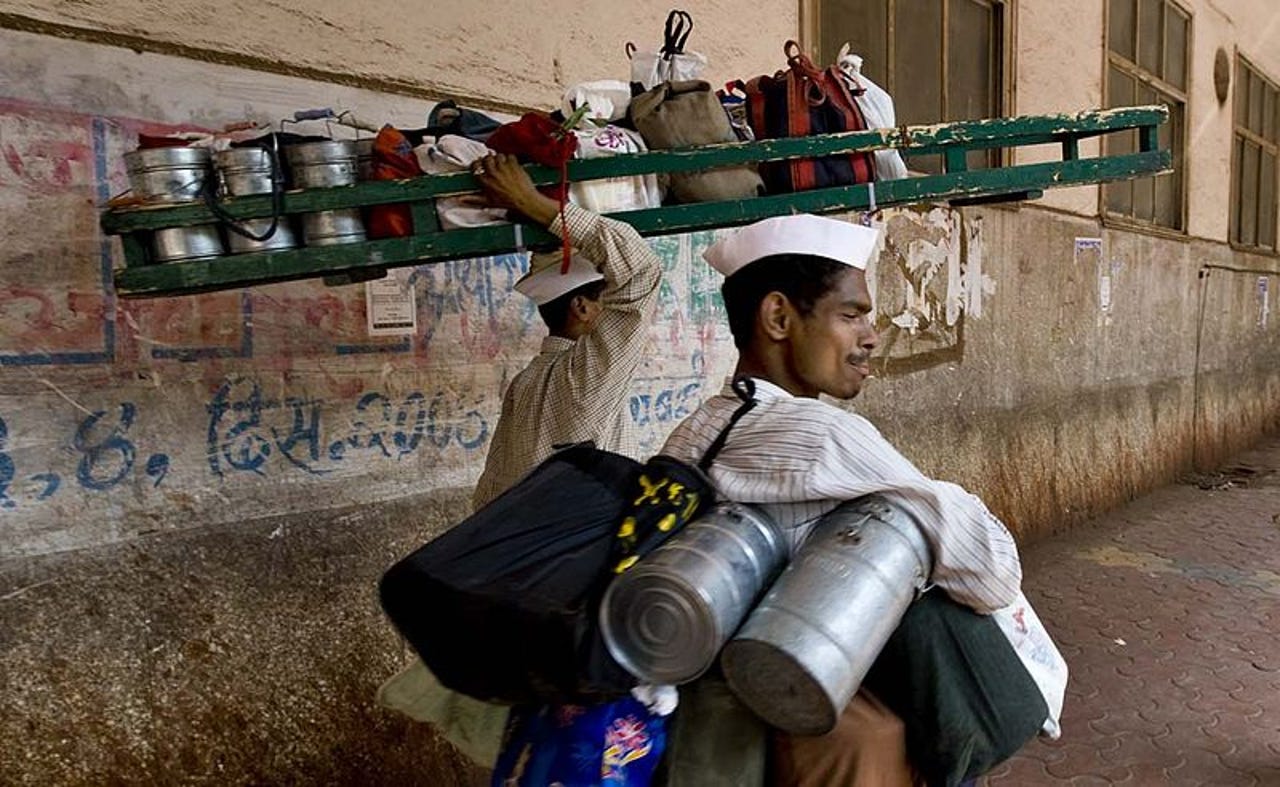What India startups can learn from Dabbawalas

One of the best case studies when it comes to running a successful process-driven error-free, low-investment and high-profit making business from India, is the well-known Six Sigma-certified Mumbai Dabbawala Association.
What is the Dabbawala Association? And why is it so well recognized for being a lunch delivery provider? What makes it stand out from everyone else? These are questions which have been answered and discussed time and again especially if you're familiar with this mighty successful business.

So to give a little perspective for those who don't know about the organization, well, it's a very old Indian business chain, and by any means would I call it small especially when they deliver food to millions of hungry citizens in Mumbai, India.
Dabba (which means box or lunchbox) carriers are called, dabbawala. They are delivery men who collect freshly cooked food prepared and stored in lunchboxes from various Indian homes, mostly of suburban office workers, and then delivered to their respective workplaces. Dabbawala would then return the empty boxes back to the customer's house before they even return from work.
For those wondering, why would you want dabbawala to carry your tiffin? And what real-world problems is it solving when you look at it from a startup perspective.
Solving two Indian challenges
One is that Mumbai local trains have lines extending 60 to 70km, and they are very crowded. To reach office at 9 or even 10 in the morning, a lot of workers would have to begin their journey early in the morning and it would be a great hassle for members of your family to wake up as early as 6 in the morning to prepare your lunch.
Second, even if you do have to travel a little late, the trains are pretty crowded and a full-sized meal box would be a hassle to carry in such a crowded train.
So with its ability to solve these two real-world problems, the Dabbawala Association has been in business for over last 125 years.
It has a team of around 5,000 people, most of whom are skilled laborers who work round the clock using various modes of transport, trains, cycles, hand-pulled carts, huge carriers over the top of their head--you name it, they have it. Many of them cannot read or write, or don't use any form of fancy technology or computers, yet, they are better performers than the most of the folks you see working for any startup. This has been continuing for ages now.
In 1998, Forbes Magazine recognized its reliability to match the Six Sigma standard. This means that the dabbawalas make less than 1 mistake in every 6 million deliveries.
A very driven business with all the fundamentals required for a successful startup is evident in each and every employee of the Dabbawala Association.
If you really look at it from the cultural aspect, they all are founders and stakeholders who give more than 100 percent each time they are out there doing their job. Come hell or highwater, your dabbawaala will never fail you--be it the heavy rains during monsoon, or shutdown of various forms of transport on a lot of days, or any kind of traffic jam--nothing stops these folks from doing their job.
They know every nook and corner of each street they have to go to and are more often than none accurate and timely in their deliveries. They have a very insighftul coding system on the lunchboxes based on the delivery area and most of the work is done on paper, without the use of any kind of technology--except the association's recent service of enabling booking via SMS. This is indicative of how it's adapting to change and scaling the business.
So what are the learnings startups can take from this amazing feat of solving real-world problems without any hiccups?
I liken it to the Lean Six Sigma approach that counts for everything. The challenges they face are real and startups--or any business for that matter--certainly can take home a lot of learnings. I'd like to focus on a few of those aspects taking a cue from this brilliant institution.
Ownership
"Ownership is a feeling that an employee has to instill in oneself, and unless you get that feeling of ownership you cannot work excellently," Pawan Agarwal, CEO of Dabbawala Association, said during one of his speeches at the E-Summit 2012 in IIT Delhi.
Yes, driving this is an important aspect when it comes to startups. Building that culture is an integral part of making your startup successful. Very few people today aspire to become linchpins within organizations they work for. If your startup is driving that culture, appreciating the hard work, and giving the employees and stakeholders to nurture ownership of any kind, you would actually see the efficiency increase manifolds immediately.
Simplicity
The people of Mumbai say with confidence: "Our lunch can go wrong but not the Mumbai dabbawalas." Why is that possible? It all boils down to keeping things simple.
Be it a Steve Jobs or Picasso, all the great artists always had a penchant for simplicity. The dabbawalas maintain that value and drive great efficiency at keeping their basics simple. The process is very lean, very uncomplicated, and doesn't involve any form of algorithms or flowcharts or complicated SOPs and process charts or reports.
The best innovations world over are the simplest.
Standardization
Yes, the Dabbawala Association is also ISO 9001:2000-certified.
In fact, take a look at the simple colour coding system which acts as an identification system for the destination and recipient. It uses hardly any complicated documentation. All their documentation is on the books which are maintained for years, and the pricing structure is standard--no matter from what location to what location the delivery has to be made.
Build, measure, learn
Understanding the need to keep pace with the fast-changing world around us and the use of mobile technology in the city and globally, the Dabbawala Association recently started to embrace technology and now allow for delivery through SMS. According to the organization, it sees a growth rate of between 5 and 10 percent every year.
Build services around your own infrastructure
Dabbawalas use a combination of various transport modes, especially very efficient and low cost ones. Trains, cycles, and handcarts contribute to maintaining reliable, efficient, and accurate delivery timelines.
As lean as it gets
If you consider the dabawallas, their invesment is bare minimum--two bicycles, a wooden crate for the tiffins, white cotton kurta pyjamas, and the trademark white Gandhi cap, or topi as it's called. The returns on capital are based on the monthly division of earnings of each unit.
And it also works on standardization as far as you look at it. They charge around 450 rupees (US$7.95) per month per customer, and they acquire scalability in form of gaining more traction and customers as they go.
When you look at this enterprise, certainly there's a lot more that everyone can learn from, but one most important aspect and one that cannot be ignored no matter which business your startup is--customer is king! In fact, dabbawalas go a step further. They regard their customer as their Lord Vitthala. Now that's something that says a lot about what they stand for, doesn't it?